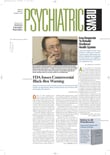APA submitted extensive comments and recommendations last month to the Centers for Medicare and Medicaid Services (CMS) in response to CMS's proposed rule regarding the implementation of the new Medicare Part D Prescription Drug Benefit. The chief recommendation is a call for an alternative formulary for Medicare beneficiaries with mental illness diagnoses.
By “alternative formulary,” APA is referring to a formulary that “contains no restrictions as to which drugs are available” for the treatment of people with mental illness.
Under the proposed rule, prescription drug plans (PDPs) that offer coverage under Medicare Part D would be required to create formularies for their Medicare beneficiaries and would be entitled to implement conventional cost-saving mechanisms such as preferred drug lists, mandated generic and/or therapeutic substitution, and step therapies including“ fail-first” provisions.
For example, under proposed guidelines for formulary development, CMS would mandate a specific list of drug categories and classes that would have to be included by all PDPs. But current law requires that PDPs cover only “one or more” medications from each category or class. Thus, PDPs could include on their preferred drug list as few as three antipsychotic medications—one “phenothiazine,” one“ non-phenothiazine,” and one“ non-phenothiazine/atypical,” the three proposed classes of antipsychotics required of all formularies.
Alternative Formulary Proposed
APA previously submitted extensive testimony and recommendations on the drug classes and categories proposed in the rule (Psychiatric News, October 1). In follow-up comments last month, APA recommended an“ alternative formulary” that would exempt patients with mental illness from coverage under the standard formulary provisions and“ provide immediate access to the relevant classes of drugs needed to treat this class of enrollees and their unique medical needs that correspond to their DSM-IV-TR diagnoses.”
The comments and recommendations were prepared by APA's Division of Advocacy and Public Policy, through the combined efforts of APA staff in the departments of Government Relations and Healthcare Systems and Financing. The 24-page document painstakingly makes the scientific, medical, and legal case for CMS to allow an alternative formulary for beneficiaries with mental illness. (See related article in “Medical Director's Desk” on
page 4).
“Psychiatric medications are the essential technology component of contemporary medical treatment for these medical illnesses,” the comments asserted. “The newer medications represent a significant advancement in treatment options that medical practitioners can utilize while minimizing the debilitating impact of severe mental illness and restoring patient functioning. Clinically appropriate access to state-of-the-art medications enables utilization of these clinical and technological advances to help millions of Americans treated in the mental health system.”
Congress, in enacting the Medicare Prescription Drug Improvement and Modernization Act (MMA), said in the report of the House and Senate Conference Committee on the new legislation that CMS should pay special attention to the needs of Medicare beneficiaries with mental illness, ensuring that they have“ clinically appropriate access” to appropriate medications. CMS specifically requested, within its Notice of Proposed Rule Making, that anyone representing vulnerable populations with unique medical needs comment on the best mechanism to provide clinically appropriate access to medications.
Specifically, APA recommended that an “alternative formulary be established for Medicare enrollees with a diagnosis as defined by the DSM-IV-TR, and cross-referenced by the appropriate ICD-9 code, and for whom it has been determined that it is medically necessary that their condition be treated with a pharmacologic agent.”
That formulary should include specific management mechanisms tailored to the unique medical needs of the population, and include payment-adjustment devices that “provide incentives for [prescription drug plan] participation and equitable compensation for the reasonable cost of the alternative formulary.”
The need for an unrestricted formulary is verified, APA said in its comments, by the definition of Medicare beneficiaries with mental illness as a vulnerable population with unique medical needs and the use of medications that are not interchangeable therapeutically.
In addition, the comments stressed, the formulary-management strategies and the exceptions promulgated in the proposed rule are “unproven and will not facilitate treatment for vulnerable populations with unique medical needs.” In fact, APA believes that “clinical outcomes will be gravely compromised and there will be negative fiscal consequences for the Medicare program if restricted formularies are permitted.”
Alternative Strategies Proposed
APA's comments suggested that there are a number of alternative cost-management strategies that help to control rising prescription drug costs while not limiting access to care for vulnerable patients. These include medication algorithms, which guide physician choice of medications for specific illnesses toward those medications for which the strongest evidence base exists. In addition, disease-management programs, such as those developed for schizophrenia and depression, have been successful at slowing the steadily increasing costs of care. Prescriber profiling and education programs that aim to help physicians gear their prescribing practices toward following accepted consensus guidelines for treatment have been shown to slow escalating costs of pharmacotherapy treatment.
In contrast, APA wrote, strategies such as prior authorization, “fail first,” step therapy, and therapeutic substitution, employed in many restrictive formularies to contain costs, are likely to decrease overall quality of care in patients with mental illness. Ultimately, said APA, these strategies result in higher costs to the system through increased emergency and inpatient service utilization.
APA's document urges CMS to adopt the suggested unrestricted formulary and, at a minimum, “implement a grandfathering procedure” to help ensure continuity of care when patients transition from existing privatized or Medicaid coverage to the new Medicare Part D drug benefit.
“In the end,” the document concluded, “we believe that an alternative formulary for this class of enrollees benefits both a vulnerable population and the success of the Medicare Part D program.”
A copy of APA's comments and recommendations is posted online at<www.psych.org/advocacy_policy/reg_comments/cms-4086.pdf>.▪
